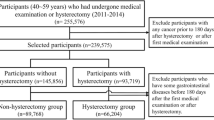Abstract
Introduction
Colorectal cancer (CRC) is the most common gastrointestinal malignancy. There is an association between CRC and endometrial cancer (EC). Up to 10% of this linkage may be due to hereditary non-polyposis colorectal cancer but in the majority of patients a genetic disorder is not found. The National Comprehensive Cancer Network (NCCN) guidelines on CRC since 2005 have suggested that women with endometrial or ovarian cancer diagnosed at less than 60 years of age have CRC screening with colonoscopy beginning at age 40 or at time of diagnosis of the gynecologic tumor. We assessed our population of women with EC to determine if women were receiving CRC screening after a diagnosis of EC.
Methods
Electronic medical records of all women diagnosed at our institution with EC predominantly between 1997 and 2007 were reviewed. We assessed age at diagnosis, tumor type, family history of malignancy, CRC screening, and findings at CRC screening and recorded the information in a database. Patients were evaluated for the Amsterdam and Bethesda criteria. This study was approved by the Institutional Review Board.
Results
Two hundred sixty-seven women with EC were evaluated. The median age was 66; 39% were less than age 60 at diagnosis. Family history of CRC was present in 25 (9.4%) of EC patients. Of these women, 125 (46.8%) had CRC screening, with 12 (9.6%) being screened for CRC within 1 year of diagnosis and 33 (26.4%) screened for CRC before diagnosis of endometrial cancer. Of the women, 142 (53.2%) did not have CRC screening reported. Of the women screened, ten had adenomatous polyps with one of those polyps being greater than 1 cm, four had tubulovillous histology, and three had CRC. Colonoscopy was performed in 59.2% of women who underwent CRC screening. One woman met criteria for Amsterdam and Bethesda criteria.
Conclusions
Less than half of women with EC received screening for CRC. Women who were screened had significant pathology in 13.6% of cases and 2.4% had colon cancer. The NCCN guidelines should be more aggressively followed by physicians who care for women. A prospective colonoscopy screening study on these women with EC to assess the yield and utility in screening in this population is needed.




Similar content being viewed by others
References
Lu KH, Schorge JO, Rodabaugh KJ, et al. Prospective determination of prevalence of Lynch syndrome in young women with endometrial cancer. J Clin Oncol. 2007;25:5158–64.
Myrhij T, Bisgaard ML, Bernstein I, et al. Hereditary nonpolyposis colorectal cancer; clinical features and survival. Results from the Danish HNPCC register. Scand J Gastroenterol. 1997;32:572–6.
Oncology (Williston Park). NCCN Practice guidelines for colorectal cancer screening. V.2.2008. 2000;14(11A):203–12.
Guttmacher A, Collins F. Hereditary colorectal cancer. NEJM. 2003;348:919–32.
Kehoe S, Kauff N. Screening and prevention of hereditary gynecologic cancers. Semin Oncol. 2007;34:406–10.
Garber J, Offit K. Hereditary cancer predisposition syndromes. J Clin Oncol. 2005;23:276–92.
Lu K, Dinh M, Kohlmann W, et al. Gynecologic cancer as a “sentinel cancer” for women with the hereditary nonpolyposis colorectal cancer syndrome. Obstet Gynecol. 2005;105:569–74.
Lanspa SJ, Jenkins JX, Cavalieri J, et al. Surveillance in Lynch syndrome: how aggressive? Am J Gastroenterol. 1994;89:1978–80.
Tsai F, Strum W. Family history of single first-degree relative with colorectal cancer does not predict increased risk of advanced adenomas on screening colonoscopy in a Southwestern US population. GIE. 2008;67:AB83.
Vasen HF, Watson P, Mecklin JP, et al. New clinical criteria hereditary nonpolyposis colorectal cancer. (HNPCC, Lynch syndrome) proposed by the International Collaborative group on HNPCC. Gastroenterology. 1999;116:1453–6.
Umar A, Boland CR, Terdiman JP, et al. Revised Bethesda guidelines for hereditary nonpolyposis colorectal cancer (Lynch Syndrome) and microsatellite instability. J Natl Cancer Inst. 2004;96:261–8.
Lancaster J, Powell C, Kauff N, et al. SGO education committee statement on risk assessment for inherited gynecologic cancer predispositions. Gynecol Oncol. 2007;107:159–62.
Rex DK, Johnson DA, Anderson JC, et al. American College of Gastroenterology guidelines for colorectal cancer screening 2008. Am J Gastroenterol. 2009;104:739–50.
Acknowledgement
Jim Koziol, Phd, The Scripps Research Institute, La Jolla, CA, USA.
Conflict of Interest
None.
Author information
Authors and Affiliations
Corresponding author
Rights and permissions
About this article
Cite this article
Singh, M.M., Singh, E., Miller, H. et al. Colorectal Cancer Screening in Women with Endometrial Cancer: Are We Following the Guidelines?. J Gastrointest Canc 43, 190–195 (2012). https://doi.org/10.1007/s12029-011-9271-3
Published:
Issue Date:
DOI: https://doi.org/10.1007/s12029-011-9271-3




